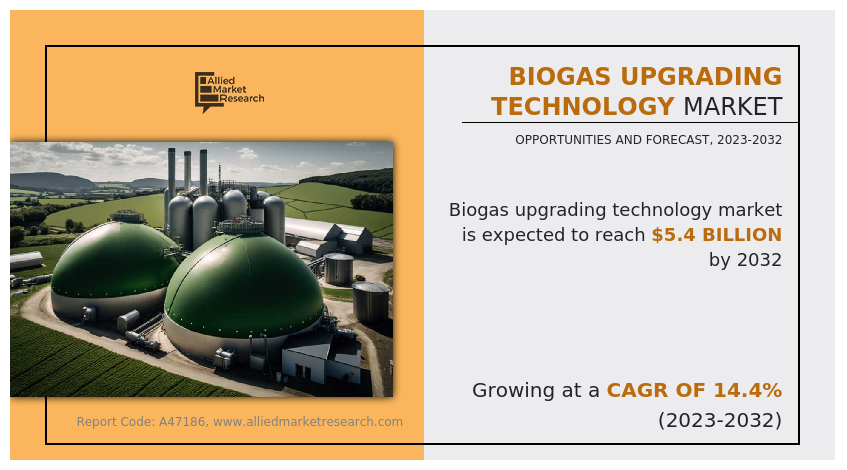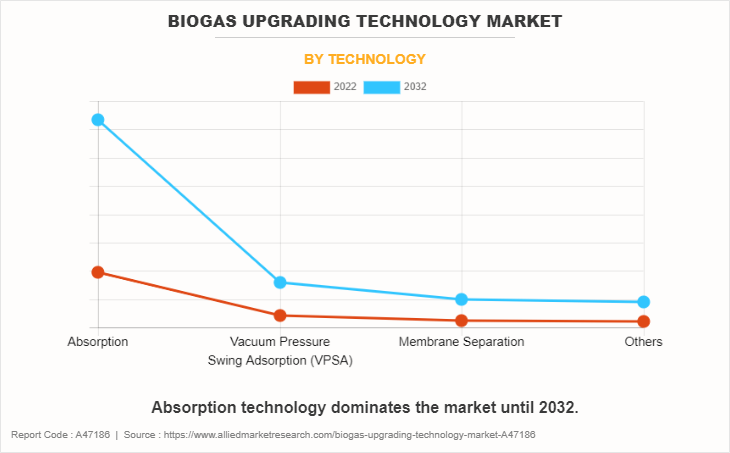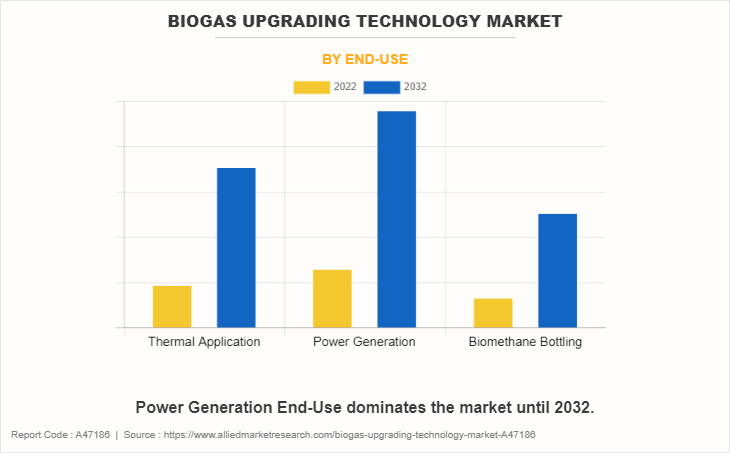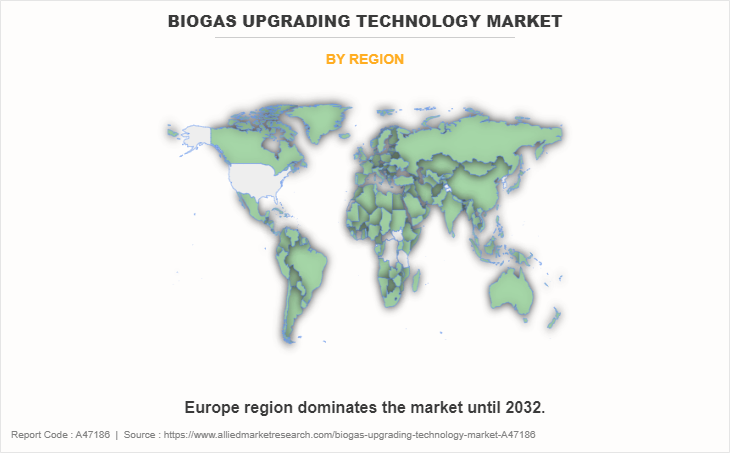Biogas Upgrading Technology Market Research, 2032
The global biogas upgrading technology market was valued at $1.4 billion in 2022, and is projected to reach $5.4 billion by 2032, growing at a CAGR of 14.4% from 2023 to 2032.

Biogas upgrading technology plays a pivotal role to harness the potential of biogas, which is produced through the anaerobic digestion of organic materials, into a sustainable energy resource. This technology optimizes, controls, and contains the anaerobic digestion process that allows for the efficient conversion of biogas into a sustainable energy source. Biogas typically contains 50-70% methane, making it a valuable source of clean energy. Furthermore, the organic elements left over after digestion, known as digestate are reused as soil amendments or fertilizers, helping to promote sustainable farming practices.
There are presently 2,200 active biogas systems in the U.S., with the potential to install approximately 13,500 more systems. These systems collect biogas for heat and power generation, decreasing reliance on fossil fuels and cutting methane emissions into the atmosphere. The European Union is also embracing biogas upgrading technology, with ambitious targets to produce significant volumes of biomethane by 2030 and 2050. Biomethane, a cost-effective renewable fuel with enormous potential, significantly cuts emissions and noise pollution in the transportation industry.
The waste management strategy of South Africa, which aims to reduce landfill waste by diverting organic materials to biogas digesters, has a positive impact on the development of biogas upgrading technology. The growing interest of consumers and government authorities in sustainable waste management practices and utilization of biogas as a renewable energy source present lucrative growth opportunity for the biogas upgrading technology market.
Furthermore, biogas upgrading technology offers a diverse range of applications and benefits that contribute to its growing prominence in the global energy landscape. One significant advantage is its ability to upgrade raw biogas into biomethane, also known as renewable natural gas (RNG). This highly pure biomethane be used as a clean and sustainable vehicle fuel or directly injected into natural gas pipelines. The adaptability of biogas upgrading technology makes it a reliable energy solution that replaces or supplements conventional fossil fuels such as coal and natural gas. It provides both, baseload and peak power.
One significant advantage of biogas upgrading technology for the environment is the decrease in methane emissions into the atmosphere. By capturing and utilizing biogas, the industry actively mitigates methane, a potent greenhouse gas, and contributes to climate change mitigation efforts. This reduction in greenhouse gas emissions aligns with global sustainability goals and strengthens the case for further adoption of biogas upgrading technology.
In addition to its environmental advantages, biogas upgrading technology supports economic growth and job creation. Agriculture, waste management, and renewable energy are few industries that benefit from the development and operation of biogas facilities. Energy security for nations is improved by investing in this technology to produce biomethane that is derived from biogas, which results in decrease in reliance on imported fossil fuels.
As the circular economy concept gains traction globally, the role of biogas upgrading technology becomes even more critical. The potential to divert organic waste from landfills and transform it into a valuable energy resource not only addresses waste management challenges but also contributes to the sustainable development goals of reducing waste and promoting resource efficiency.
G-20 Impact on Biogas Upgrading Technology Market:
The Indian G-20 meeting has set the stage for a significant and transformative impact on the biogas upgrading technology market. The proposal for a biofuel alliance among G-20 countries, championed by the Indian Biogas Association (IBA), carries immense potential for this technology and the broader renewable energy sector. The potential opportunities, estimated at $500 billion over the next three years, underscore the pivotal role that biogas upgrading technology plays in this alliance.
Biogas is positioned as a key player within this initiative due to its favorable characteristics. It requires comparatively lower investment as compared to other energy generation options and benefits from easy access to raw materials. The prospect of generating approximately $200 billion in opportunities highlights the cost-effectiveness and resource availability of biogas as a renewable energy source.
The success of the biofuel alliance hinges on several critical factors. One of them is the creation of a favorable regulatory environment in G-20 countries. Such regulations should incentivize and support the development and utilization of biogas upgrading technology and other biofuel technologies. In addition, sharing technological advancements across G-20 nations is vital for advancing the efficiency and effectiveness of biogas upgrading processes.
International co-operation and the sharing of best practices among G-20 nations related to biogas upgrading technology is also instrumental in ensuring the success of this biofuel alliance. Research, development, and application of biogas upgrading technology done in collaboration result in innovations and breakthroughs that advance the market.
The G20's commitment to increase the proportion of renewable energy in their energy mix lays a solid policy foundation for the development that has impact on biogas upgrading technology market forecast, as evidenced by the adoption of the voluntary action plan on renewable energy in 2016. India's amazing solar energy expansion highlights the possibility of the switch to cleaner, more sustainable energy sources and serves as a model for other G20 nations.
With the necessary financial assistance and a $100 billion initial investment, the biofuel business, which includes the biogas sector, has the potential to expand more swiftly. This anchor investment encourages private sector involvement and propels the production of biofuels, highlighting the importance of biogas during the forecast period.
In conclusion, the Indian G20 meeting and the proposed biofuel alliance offer a promising outlook for the biogas upgrading technology market. With substantial investment opportunities, policy support, and international collaboration, biogas upgrading technology industry is poised to play a central role in advancing renewable energy goals and contributing to a more sustainable and environmentally friendly global energy landscape.
The biogas upgrading technology market scope is segmented on the basis of technology, end-use, and region. By technology, the market is segregated into absorption, vacuum pressure swing adsorption, membrane separation, and others. On the basis of end-use, it is segregated into thermal application, power generation, and biomethane bottling. Region-wise, the market is analyzed across North America, Europe, Asia-Pacific, and LAMEA.

In 2022, the absorption segment held the largest share in biogas upgrading technology market forecast, accounting for over two-thirds of global revenue. This is due to rising demand for renewable natural gas and stringent environmental regulations. However, cryogenic separator technology is projected to experience the highest CAGR from 2023 to 2032.

The power generation segment held the highest market share in 2022, accounting for nearly half of global biogas upgrading technology market share. The shift towards renewable energy sources and sustainability trends are driving the adoption of biogas upgrading for power generation. According to projections, the biomethane bottling industry will develop at the highest CAGR between 2023 and 2032 due to rising demand for renewable energy, stricter environmental restrictions, and expanding environmental advantages. The demand for sustainable energy generation also opens the way for a greener future.

Europe dominates the biogas upgrading technology market, accounting for over two-fifths of revenue in 2022. The Asia-Pacific region is expected to experience the fastest CAGR from 2023 to 2032, with emerging markets like India, China, and Southeast Asia boosting demand for energy resources and investment in renewable energy. The abovementioned factors will have significant impact on the biogas upgrading technology market growth.
Major biogas upgrading technology market players, such as Atmos Power Pvt. Ltd., Bright Renewables B.V., Air Liquide, Dmt environmental technology, Evonik Industries AG, Pentair Plc, Malmberg Bioerdgastech GmbH, Metener Oy, Greenlane Renewables Inc., Wartsila Oyj abp, Prodeval Corp., Aemetis Inc., Clarke Energy, Acrona Projects Sarl, Clean Energy Fuels Corp., AB Holding Spa, Spectrum Renewable Energy Limited, B-Sustain Energy Projects Private Limited, Xebec Adsorption Inc., and Verbio Vereinigte Bioenergie AG are focusing their investment on technologically advanced, cost-effective, and more secure products and solutions for various applications related to purification of biogas.
Key Benefits For Stakeholders
- This report provides a quantitative analysis of the market segments, current trends, estimations, and dynamics of the biogas upgrading technology market analysis from 2022 to 2032 to identify the prevailing biogas upgrading technology market opportunities.
- The market research is offered along with information related to key drivers, restraints, and opportunities.
- Porter's five forces analysis highlights the potency of buyers and suppliers to enable stakeholders make profit-oriented business decisions and strengthen their supplier-buyer network.
- In-depth analysis of the biogas upgrading technology market size segmentation assists to determine the prevailing market opportunities.
- Major countries in each region are mapped according to their revenue contribution to the global market.
- Market player positioning facilitates benchmarking and provides a clear understanding of the present position of the market players.
- The report includes the analysis of the regional as well as global biogas upgrading technology market trends, key players, market segments, application areas, and market growth strategies.
Biogas Upgrading Technology Market Report Highlights
| Aspects | Details |
| Market Size By 2032 | USD 5.4 billion |
| Growth Rate | CAGR of 14.4% |
| Forecast period | 2022 - 2032 |
| Report Pages | 340 |
| By Technology |
|
| By End-Use |
|
| By Region |
|
| Key Market Players | Prodeval Corp., Atmos Power Pvt Ltd., Xebec Adsorption Inc, Bright Renewables B.V., VERBIO Vereinigte BioEnergie AG, Aemetis, Inc., Clean Energy Fuels Corporation, Evonik Industries, Malmberg Bioerdgastech GmbH, B-Sustain Energy Projects Private Ltd., Acrona Projects SARL, Wartsila, Metener Oy, Greenlane Renewables Inc., Clarke Energy, DMT Environmental Technology, Inc., Spectrum Renewable Energy Limited, AB HOLDING SPA, Pentair plc, Air Liquide |
Analyst Review
According to CXO's perspective, the biogas upgrading technology market is poised for remarkable growth, primarily driven by the escalating demand for alternative fuels in developing countries and increase in green alternatives in developed nations such as the U.S. and the UK. The heightened focus on stringent regulations against fossil fuels and the fluctuating cost of crude oil significantly influence petroleum product pricing, making organic biogas an attractive prospect. The growing environmental awareness is driving major manufacturers to invest in alternative energy solutions, boosting the demand for organic biogas.
The shift towards renewable resources and increase in popularity of biogas as a green fuel boost its development. Biogas is gaining popularity for its ability to combat nitrogen pollution, electricity generation, and methane emissions from sources such as manure lagoons or landfills. The Asia-Pacific region is expected to lead the global biogas upgrading technology market, with countries such as China and India experiencing rapid industrialization and surge in demand for transportation fuels such as bio-CNG and bio-LNG. The scarcity of petroleum resources in the region underscores the importance of anaerobic digestion technology, creating opportunities for biogas upgrading technology companies.
CXOs closely monitor these trends and capitalize on the market growth potential by investing in innovative biogas upgrading solutions, aligning with global sustainability goals, and meeting the rise in demand for eco-friendly energy sources.
The report focuses on the biogas upgrading technology market analysis's growth prospects, restraints, and trends. The study provides Porter’s five forces analysis to understand the impact of various factors, such as the bargaining power of suppliers, competitive intensity of competitors, threat of new entrants, threat of substitutes, and bargaining power of buyers, in the biogas upgrading technology market.
Among the analyzed regions, Europe accounted for the highest revenue in the global market in 2022. However, Asia-Pacific is expected to grow at a higher rate, predicting lucrative opportunities for the key players operating in the biogas upgrading technology market.
Advanced Membrane Technologies, Electrochemical Upgrading, Integration with Renewable Energy, Hydrogen Production, Decentralized Biogas Upgrading are the upcoming trends of Biogas Upgrading Technology Market in the world.
The leading application of Biogas Upgrading Technology is in the production of Renewable Natural Gas (RNG) or biomethane.
Europe is the largest regional market for Biogas Upgrading Technology
Air Liquide, Dmt environmental technology, Evonik Industries AG, Pentair Plc, Malmberg Bioerdgastech GmbH are the top companies to hold the market share in Biogas Upgrading Technology.
$5.4 billion is the estimated industry size of Biogas Upgrading Technology Market.
Loading Table Of Content...
Loading Research Methodology...



